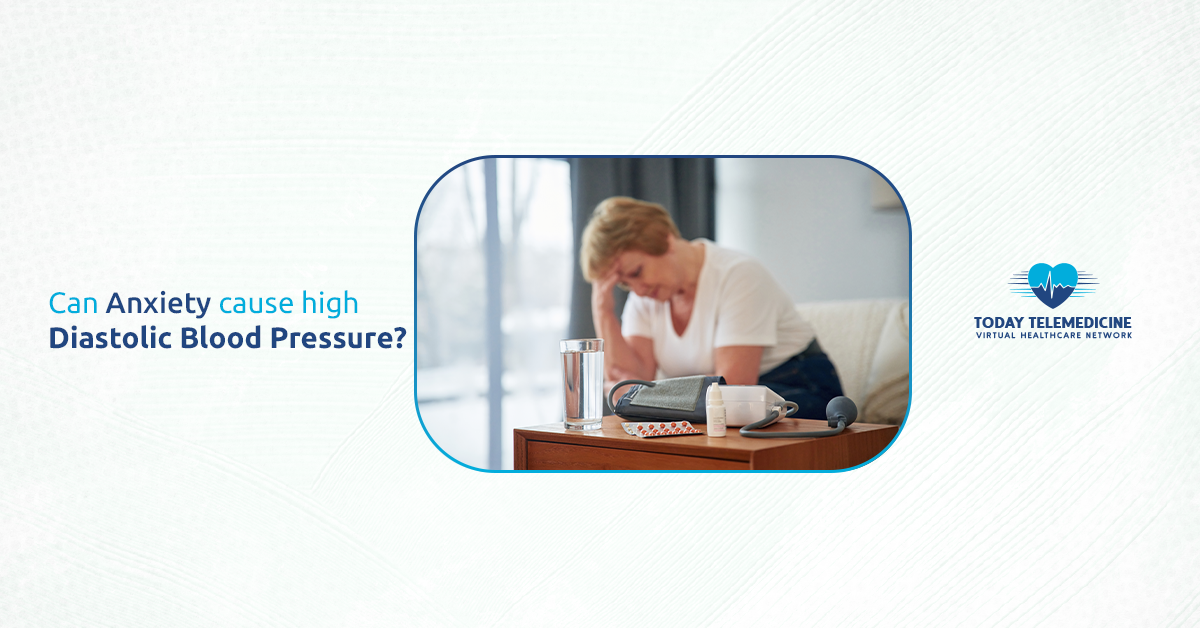Can anxiety cause high diastolic blood pressure? This question often gives patients who deal with both conditions daily a lot of trouble.
Most people will notice their heart rate is on the higher side when they are restless or anxious, but the question does anxiety cause high diastolic blood pressure?
Let’s discuss this in easy language.
Are you searching for a therapist to support you in times of anxiety? Meet our therapist at Today Telemedicine. They’ll create a plan to help you relax. Contact us for more details.
Understanding Blood Pressure
Blood pressure is necessary, acting on vascular partitions. It has two key figures:
- Systolic Blood Pressure: The upper number shows the force during heartbeats.
- Diastolic Blood Pressure: The lower number measures pressure when the heart rests.
Usually, a normal diastolic blood pressure is between 60-80 mmHg. It may show isolated high diastolic blood pressure instead of 80 mmHg, but this is rare.
Can Anxiety Cause High Diastolic Blood Pressure?
Yes, anxiety temporarily raises diastolic blood pressure. When times get tough, your system reacts by discharging tension hormones like:
- Adrenaline
- Cortisol
These hormones increase your heart rate and tighten blood vessels. As a result, blood pressure rises.
The Short-Term Effects
Anxiety may temporarily spike your diastolic numbers, but don’t worry! They usually return to normal once the anxiety passes.
Long-Term Effects
However, be cautious—frequent anxiety can lead to lasting blood pressure issues.
What Causes Isolated Diastolic Hypertension?
Diastolic pressure increases, while systolic remains normal. This is called isolated diastolic hypertension. Some common causes of isolated diastolic hypertension include:
- Chronic stress and anxiety: Continuous anxiety can injure your heart’s filling function.
- Sedentary lifestyle: A lack of activity reduces heart strength and alters blood pressure.
- Unhealthy diet: Chowing down on salty snacks and caffeine can lift diastolic BP.
- Genetics: A family background of high blood pressure raises your likelihood.
- Smoking and alcohol: These elements can lead to blood vessel rigidity and pressure.
Anxiety and Diastolic Dysfunction
Anxiety and diastolic dysfunction are related to one another. Diastolic dysfunction arises when the heart’s lower sections don’t soften after each beat. This makes it hard to pump blood. Common symptoms are:
- Shortness of breath
- Fatigue
- Swelling legs
The chronic anxiety can make this condition worse as it sucks the body into an eternal turmoil of stress.
Does Diastolic BP Increase with Exercise?
Movement frequently raises systolic blood pressure, but diastolic blood pressure stays constant.
However, for some people with existing heart diseases, isolated diastolic BP is the more important one, rather than systolic BP.
If you or a relative experience this, seeing a cardiologist should be your first step.
Can Anxiety Cause Hypotension?
Anxiety usually raises blood pressure, but sometimes anxiety can cause low blood pressure. Some people face the following problems:
- Dizziness
- Fainting
- Extreme fatigue
This is because anxiety is a condition that can bring about sudden changes in the heart rate, and sometimes it can suppress the blood pressure rather than raise it.
Can Being Nervous Raise Blood Pressure?
Yes, being nervous can raise blood pressure. This is a normal response to stressful situations, such as:
- Public speaking
- Medical procedures
- Job interviews
If nervousness leads to frequent blood pressure spikes, managing stress and anxiety becomes crucial.
How to Manage Anxiety and Blood Pressure?
-
Lifestyle Modifications
Making small, consistent changes can help reduce both anxiety and high diastolic blood pressure:
-
Regular Exercise
Exercise is one of the most effective behaviors for high blood pressure that leads it to the normal level. It can be basically for example taking a walk, doing yoga or swimming, which really enhances blood circulation, reduces the heart’s burden and stabilizes the nerves.
-
Healthy Diet
Eating plenty of vegetables, fruits, whole grains, and beans improves.
-
Limit Caffeine and Alcohol
These are chemicals that have a direct negative impact on the body and at times contribute to hypertension too. Thus, it is a wise idea to avoid them whenever possible.
-
Quit Smoking
Nicotine narrows your blood vessels. This causes your heart pressure to stay high. So, it’s better to quit smoking.
-
Stress Management Techniques
Learning how to relax can bring down your high blood pressure greatly caused by tension:
-
Deep Breathing Exercises
Inhalation strategies, like deep breathing, are great for your heart. Box breathing can also help your pulse find peace. Together, they help control your heart rate and keep your pressure steady.
-
Meditation and Mindfulness
Mindfulness meditation helps us stay calm. It manages our nervous system and stabilizes cortisol concentrations.
-
Progressive Muscle Relaxation (PMR)
It is relieving the tension through a systematized approach to relaxed muscles.
-
Cognitive Behavioral Therapy (CBT)
Cognitive Behavioral Therapy efficiently deals with anxiety. It helps people lower blood pressure and stress. CBT does this by identifying and managing negative thought patterns.
-
Medications for Anxiety and Hypertension
Sometimes, certain drugs may be required for individuals who are suffering from severe anxiety due to high blood pressure. The common options of these include:
- Beta-Blockers (e.g., Propranolol): Lower heart rate and minimize blood pressure.
- Anti-Anxiety Medications SSPIs: Relieve stress and deter the danger of high blood pressure.
- ACE Inhibitors and Calcium Channel Blockers: Used in the cases where hypertension is continuous.
Before starting or stopping any medications, it is important to see a doctor first.
Conclusion
So, can anxiety cause high diastolic blood pressure? Yes, anxiety can cause temporary increases in diastolic blood pressure. In rare cases, it may also lead to long-term heart problems.
However, increasing blood pressure can be controlled by stress management, which involves lifestyle changes
If you sometimes have isolated high diastolic blood pressure, it’s good to consult a doctor for advice. They can identify the problem and recommend suitable therapy.
FAQs
Does anxiety make your blood pressure go up?
Anxiety indeed can lead to a momentous increase in your blood pressure. If the condition persists, it could cause blood pressure issues in the long run.
Does stress raise diastolic blood pressure?
Yes, the stress causes the diastolic pressure to rise temporarily. In this state, the body operates in a fight or flight mode, thus ending up with an increased heart rate and blood pressure.





